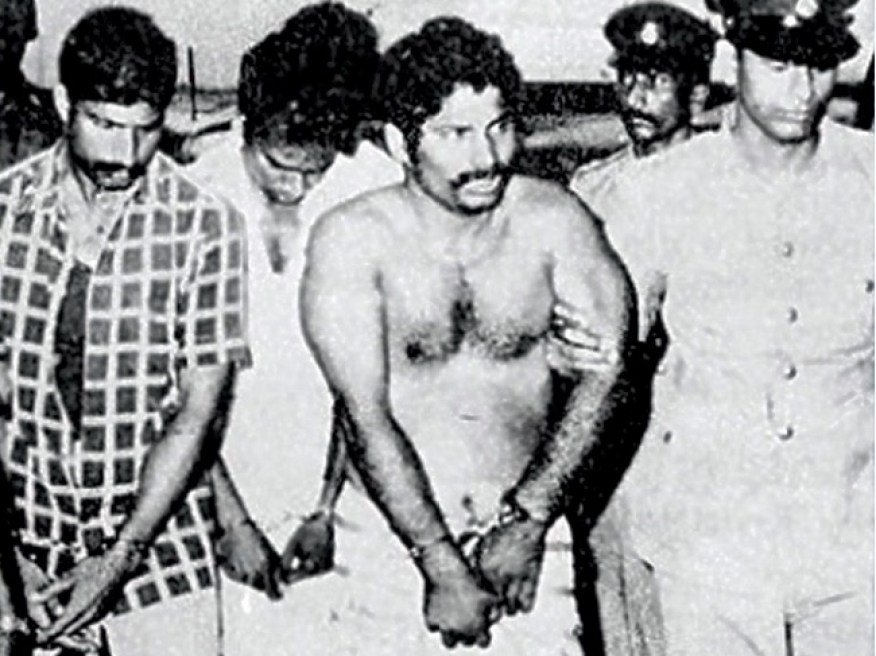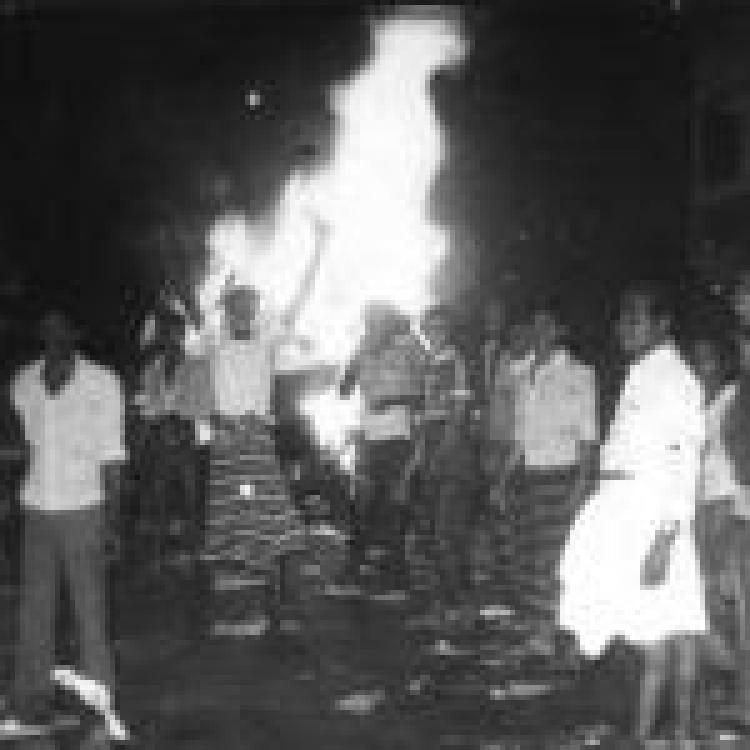
Selvarajah Yogachandran, referred to as Kuttimani, and Nadarajah Thangavelu, alias Thangathurai were the co-founding leaders of TLO (Tamil Liberation Organisation). The group consisted of student revolutionaries working for a common goal – a free Tamil Eelam. TLO was informally formed in 1969, in Valvettithurai. It then later became the centralised notion for Tamil Eelam Liberation Organisation (TELO). It was rumoured that they robbed banks to fund their radical activities.
In 1976, Kuttimani’s name appeared on the list of 47 Tamil prisoners held without trial under Emergency Regulations. Martin Ennals of Amnesty International had constructed the Report of Amnesty International Mission (Jan 1975) in which it indicates that Kuttimani was a “prisoner whose case is under investigation by Amnesty International”. The report further discloses that Kuttimani was kept in Welikada and was arrested in August 1975. He was released in 1977.
On March 21st, 1981, Neervely’s Bank robbery of 8 million Sri Lankan rupees led the Sri Lankan police officials to accuse Kuttimani as the orchestrater. He was arrested on April 5, 1981 along with Thangathurai and Selvadurai Sivasubramaniam alias, Devan, while bidding to escape in a boat to Tamil Nadu. The following year, in August, Kuttimani and Jegan were served a death sentence by Colombo High Court, under the Prevention of Terrorism Act (PTA).
Ganeshanathan Jeganathan, nicknamed Jegan was a political writer and one of the members of TELO. He hailed from Thondaimanaru. The abrupt death of TULF’s Vaddukoddai MP T. Thirunavukkarasu in 1982, allowed an open seat for Kuttimani. Despite a multitude of pressure to nominate Kuttimani as their sponsored candidate in the first Presidential election, the leader of TULF, A. Amirthalingam feared the wrath of Jayewardene.
Caving to the will of the people, Amirthalingam informed the Elections Commissioner of his decision to nominate Kuttimani as the new MP of Vaddukoddai. Still, Kuttimani would not be released from prison to take his oaths, and legally, he was disqualified from membership of parliament.
On November 2nd, 1981, the trials of Kuttimani, Thangathurai and Devan began under the Sri Lanka Prevention of Terrorism Act. The outcome of the trial was a death sentence. Famously, Kuttimani stated:
“I request that I should be hanged in Tamil Eelam… I request that my eyes be donated to some blind person, so that Kuttimani will be able to see through those eyes the reality of Tamil Eelam”.
Whilst their trials were still pending, Kuttimani and Thangathurai were brutally murdered in Welikada Maximum Security Prison. Kuttimani’s tormentors “gouged out” his eyes - an allusion to the request that he had made and Thangathurai’s tongue was cut off for his speeches of nonconformity. According to Amnesty International the Sinhala prisoners were offered alcohol and permitted to attack the Tamil prisoners.
Along with Kuttimani and Thangathurai, the Tamil prisoners who were massacred in Welikada on 25th July 1983 were:
Nadesathasan, Jegan, Alias Sivarasa, Sivan Anpalagan, A. Balasubramaniam, Surash Kumar, Arunthavarajah, Thanapalasingham, Arafat, Anpalagan Sunduran, P. Mahendran, Ramalingam Balachandran, K. Thillainathan, K. Thavarajasingham, S. Subramaniam, Mylvaganam Sinnaiah, G. Mylvaganam, Ch. Sivanantharajah, T. Kandiah, S. Sathiyaseelan, Kathiravelpillai, Easvaranathan, K. Nagarajah, Gunapalan Ganeshalingam, S. Kularajasekaram, K. Krishnakumar, K. Uthaya Kumar, R. Yoganathan, S. Sivakumar, A. Uthayakumar, A. Rajan, G. Amirthalingam, S. Balachandran, V. Chandrakumar, Yogachandran Killi, Sittampalam Chandrakulam and Master Navaratnam Sivapatham.
Extracts from the press regarding Kuttimani, in 1982 and 1983:
Kuttimani nominated as MP
[Tamil Times, London, Nov. 1982, p.6]
Having successfully resisted the pressure to nominate him as its presidential candidate, the Tamil United Liberation Front (TULF) has nominated Selvarajah Yogachandran (Kuttimani) as a member of parliament to the vacancy created at the northern constituency of Vaddukoddai by the untimely death of its elected MP, Mr. T.Thirunavukkarasu. The appeal against the death sentences passed on Kuttimani and Jegan is pending. In a statement issued explaining the reasons for nominating Kuttimani, the TULF has stated: “The TULF which firmly believes in the Gandhian credo of non-violence on strong convictions and not as a matter of convenience, dissociates itself from the alleged acts of violence which Kuttimani may or may not have committed. Our irrevocable commitment to this lofty ideal of ahimsa notwithstanding, we are constrained to take this decision in exceptional circumstances owing to a variety of valid reasons:
(1) Kuttimani’s nomination is a token protest against the state terrorism perpetrated from time to time through the agencies of the police and military personnel especially on the young Tamils of the country.
(2) It is a symbol of the TULF’s protest against the iniquitous Prevention of Terrorism Act which has provided for an extraordinary procedure including provisions denying trial by jury, admitting confessions obtained by the police from the accused by various processes of torture and defying all accepted principles of law.
(3) It is a protest against the death penalty imposed on Kuttimani and Jegan.
(4) It is a protest against the cruel and inhuman treatment and torture inflicted on Tamil young men in army camps at Panagoda, Elephant Pass and now at Gurunagar, whereby alleged confessions were extorted from them to be admitted in evidence at their trials.
(5) To impress upon the government that characterizing Tamil young men who are politically oriented and motivated as terrorists and directing repressive measures against them will not help to resolve the problem. The death penalty imposed on Kuttimani and Jegan is in sharp contrast to the treatment meted out to the Sinhala youths who participated in the 1971 insurgency. Convictions and sentences imposed on them were annulled by law and they were released from jails.
Kuttimani – Death Sentence commuted to Life
[Tamil Times, London, Feb. 1983, p.7]
Selvarajah Yogachandran alias Kuttimani, who is under sentence of death following his conviction under the Prevention of Terrorism Act, has had his sentence commuted to life imprisonment under the general amnesty proclaimed by President Jayewardene on February 4. In all 62 condemned prisoners will benefit from the amnesty.
Kuttimani – Death Sentence commuted to Life
[Tamil Times, London, Feb. 1983, p. 9]
Mr. Selvarajah Yogachandran (Kuttimani) has resigned his Vaddukoddai seat in Parliament to which he was nominated by the Tamil United Liberation Front after the death of the former MP, Mr. T. Thirunavukkarasu. Mr. Yogachandran was nominated to this seat and his appointment was gazetted while he was under sentence of death. However, he was not permitted to take oaths or sit in Parliament.
Neelan Thiruchelvam – a UNP-TULF link?
[Tamil Times, London, Mar. 1983, p. 3]
The nomination of Dr. Neelan Thiruchelvam (son of the late M. Thiruchelvam, QC, Cabinet minister in Dudley Senanayake’s 1965 administration) to the vacant Vaddukoddai seat by the TULF is said to be not without political significance. Having never had to go through the hurly-burly of election politics, and therefore not being ever compelled to take a definite position publicly, and being essentially an academic-politician behind the scenes, he is said to be eminently suited to revive the UNP-TULF ‘dialogue’. He is said to enjoy cordial relations with many Cabinet ministers including the President himself. It will be recalled that Dr. Neelan was a member of the Committee that produced the report on the District Development Councils. Dr. Neelan’s nomination as MP is seen by political observers as an attempt to strengthen the hand of those sections of the TULF leadership which believe in the line of ‘negotiations’ with the government, and the eventual acceptance of the District Councils as an instrument of decentralized administration of the Northern and Eastern provinces. And with a little more power granted to District Councils, will the TULF accept District Ministerships is the question that is being currently raised in political circles. Critics of the TULF suggest that the nomination of Kuttimani as MP for Vaddukoddai in the first instance under pressure from the ‘militants’, and the present nomination of Dr. Neelan in his place concretely demonstrates the TULF’s lack of a coherent political strategy and the dilemma it faces in its attempt to reconcile the contradictory pressures within itself.

